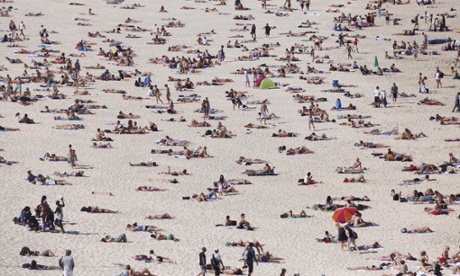Public health messages like ‘slip, slop, slap’ heralded a success as data shows a small reduction in skin cancer in under-45s

Australia is the first country in the world to show an improvement in skin cancer rates, with a small reduction in levels of melanoma and non-melanoma in the under-45 age group.
It was evidence that public health messages like “slip, slop, slap” were working, said Cancer Council Australia’s Terry Slevin, speaking on Monday at the launch of the first extensive Australian book on the prevention of skin cancer.
The evidence-based guide, called Sun, Skin and Health, uses Medicare data to show that between 2000 and 2011, there was a 2% reduction in skin cancer treatments in the 25 to 34-year-old age group and a 1% reduction in the 35-44 year-old age group.
“People age 45 and under grew up with sun-smart messages and the ‘slip, slop, slap’ campaign, messages which influenced the policy environment,” Slevin, chair of the council’s environmental cancer risk committee, said.
“But for people in their 50s and above, we’re seeing a 6% increase in skin cancer as a result of their high exposure to the sun. Unfortunately it was a population who used coconut oil and actively sought a tan.”
The guide also dispels myths about skin cancer and sun protection, including the misguided beliefs that using sun protection leads to vitamin D deficiency, and that sunscreen is not safe and contains harmful ingredients such as nanoparticles.
Vitamin D deficiency is a legitimate concern for people who rarely see the sun, or for those who cover up for cultural reasons, but people in the southern parts of Australia make enough vitamin D from September to April without overexposing our skin to UV, the book says.
And there has been no reliable evidence to suggest concentrations of nanoparticles found in sunscreen products are harmful.
The latest available Cancer Council Australia data shows that in 2010, 11,405 new cases of melanoma were diagnosed in Australia, accounting for nearly one in 10 cancer diagnoses. It is the sixth most common cause of cancer death in Australian men and 10th most common in Australian women.
Sun, Skin and Health is available through CSIRO publishing.
